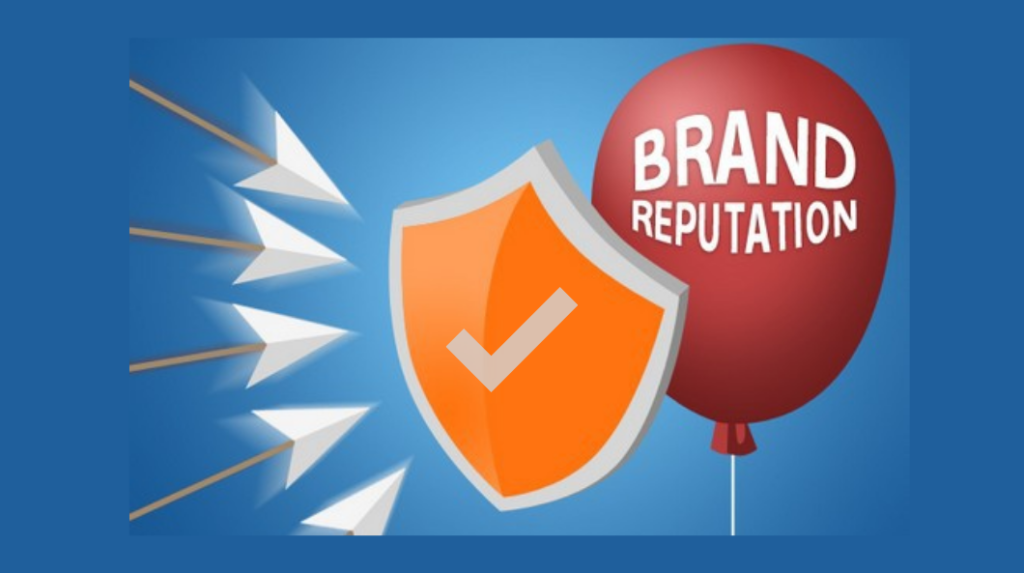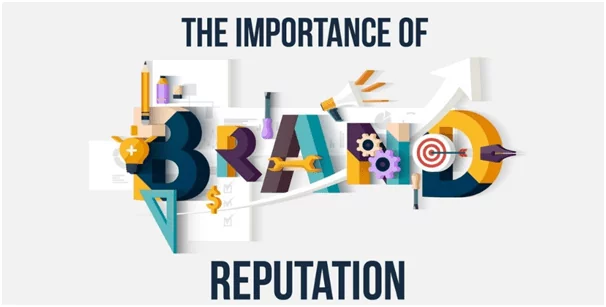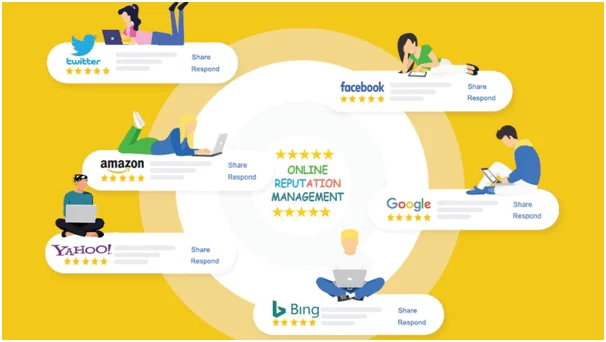Brand Reputation

Brand Reputation:
Brand reputation is the study of how a particular brand is viewed and perceived by the customers, clients, stakeholders, and the business groups. It is the combination of ideas and emotions that a customer associated with the brand and the customer service experienced during the purchase of goods or availing services and support provided by the offering company.
Formally, the brand service was used by the customers by physically visiting the store and participating in brand reputation activity by buying goods and services but now almost every brand has its online market and social media presence.

Image Source: https://fleishmanhillard.com
Before brand reputation services were available, customers had to visit stores to purchase the product or services and customers experienced the services offering in person which were not for the entire world to see and judge.
However, over time as the corporate services offerings are made available over the internet, the experiences can be shared with the entire world by leveraging the accessibility and the feasibility via the public internet and so the brands need to be more and more cautious with their every online action as it directly affects their reputation in the market and in the minds of their present as well as prospect customers.
A favorable brand reputation denotes customer trust’s the company and feel’s good about purchasing goods or availing the services. Online brand reputation management helps sustain and maintain the favorable brand reputation.
Social media and digital marketing are both boon and bane as there are cases such as trolling, infringement, fake identities, and many more. The brand needs to remain alert to its objectives of quality, excellent customer service and being customer-centric to maintain favorable brand tag.

Image Source: https://www.marketing91.com
Importance of Brand Reputation:
For any organization, Brand is their biggest intangible asset. Hence keeping a watch over the brand across all possible digital channels is a continuous challenge. Online threats are constantly evolving, and it is quite a challenging job to monitor potential online brand infringements.
It is highly important to develop a brand protection and monitoring strategy to maintain brand’s integrity and rights. Brand’s reputation is crucially important as a positive brand reputation increases customer loyalty, builds confidence within the industry, and helps businesses grow.
By availing brand reputation management service, the online brand reputation can easily be improved, while a positive brand reputation implementation can bring:
- Trust: A strong brand reputation can lead to positive trust of existing and prospective customers as they believe that the brand is here to thrive, sustain and fulfill all its promises. The customers tend to purchase the goods and services from the brand that is well known in the industry.
- Customer Loyalty: With the trust amongst the customers and a good reputation of the brand in the industry, the customers remain loyal to the brand by purchasing the products and availing the services and not going for the offerings by the competitors in the industry despite lucrative offers.
- Higher Sales: A good brand reputation in the industry results in higher sales in products and services offered by the offering organization.
- Business Growth: A good and strong brand reputation boosts confidence of the management to expand the operations at the domestic and international levels and also expand the product and services offerings.
- Free Advertising: If the customers are happy with the brand, they refer the same to their social circle with good reviews and feedback,brand reputation of the company rises in manifold with the kindness of existing customers.

Image Source: https://www.yourswebdesign.com
Brand Reputation Management:
Brand Reputation management is a marketing strategy designed to influence the customer perception of individual brand or an organization and is an important factor in growing the business.
A positive brand reputation builds trust, loyalty and increases customer confidence in the brand leading in higher sales and business growth. Brand management is not a one-time activity but a continuous and consistent practice for the business to establish as a distinct identity.
Below are the factors which contribute in building an effective and lucrative brand reputation presence:
- Organization’s Website
- Social Media presence and reach
- Third party review websites
- Media coverage – Online, TV, Print, etc.
- Awards and Credentials
- Blogs, Case Studies and Research work
- Public Speaking – Conferences, Events, etc.
- Presentations on public platforms
- Freebies – Info-graphics, eBooks, Videos and Podcasts
Brand Management using Brand Monitoring Tools:
Brand reputation management services are required by almost all the organizations and individuals who wants to have a positive impact presence in eyes of the customer and to counterfeit potential brand infringements.
In order to curb negative impact on one’s brand reputation, brand monitoring services offer various features such as:
Domain Name Monitoring: This service uses online monitoring platform to look for registrations that match the organization’s brand/trademarks including close matches and geographic factors so that the organization can enforce its rights and take ownership of domain names.
Several tools have the abilities to detect potential infringements, categorize and prioritize results, and take appropriate action against abuses. It also provides a wide range of enforcement options to help in protecting and enforcing companies’ rights, including domain recovery services.
It also checks for new domain registrations for potential infringements against the brand and categorize and prioritize the results, so the security analysts only spend time on relevant issues.
Internet Brand Monitoring: Brand monitoring software also enables the security analysts to detect potential infringements and take appropriate action against brand misuse. It uses techniques such as Search Engine Querying, Crawling via relevant links, and direct monitoring of known sites of interest. An automated prioritization process takes place before the analysts review the results in detail.
Market Place Monitoring: Potential infringement types that can affect brands, including Counterfeiting, Trademark infringements, or Infringement of Copyrights, Patents, or design rights can be effectively detected by this particular solution.
Social Media Monitoring: Several tools in this category can detect and alert intellectual property abuses such as fake profiles (brand name is used in the username or handle) and General Brand mentions (brand is mentioned in social media postings, which might be used for identifying customer comments). A bunch of social networking sites can also be monitored including Twitter, YouTube, Facebook, Instagram etc.
By using Brand Security-as-a-Service which comes with brand monitoring solution organizations can monitor online presence across Websites, Social Media handles, and Deep and Dark Web for real-time indicators of threats to brand and the overall reputation, the tools can also address the below issues:
- Logo Abuse/misuse
- Unauthorized Social media accounts in the name of brand
- Negative workplace commentary
- Website Spoofing / Phishing
- Domain Name issues – Typo squatting (URL Hijacking)
- Questionable use of corporate email account
- Objectionable content posted using brand’s name
Case Study:
A financial investment firm based in India with multiple local offices in various regions had a negative review in online search results which were suspected to be given by the competitors.
Factors affecting Brand Reputation:
- Online negative review’s
- Loss of Trust
- Reservations in existing customers
Negative Impact:
- Decline in Sales
- Adverse effect on Brand valuation
- Customer loss
- Decline in business
- Reduction in overall business profit
Solution:
Building a business service review strategy which focused on online search results to improve the online reviews by having Like and Dislike strategy, and which was like:
The customers were asked via various communication channels on the liking of services which they received, based on that whether they would recommend the company to other customers. If they liked the services, they were requested to click on Like icon or else on Dislike icon.
The liked results were directed to online review sites like Google reviews. The customer who disliked were asked if they can be contacted to resolve their issues, these customers were then redirected to point of contact person who were trained on handing such situations.
The positive feedback from customers were directed towards the positive online reviews.
The most searched and used service of the company can be highlighted by developing a new page giving the details of the service offered, optimize it to get maximum web traffic and the positive feedback of the customer, making changes in the website to improve the search engine relevance and sharing the positive feedback on social media accounts.
Result:
The outcome of the strategy would be a positive online presence with adequate brand reputation measures, and an increase in positive reviews improves the brand reputation of the company.
Security Implications:
Brand Reputation risk is typically defined as the loss to an organization through the reputational damage which indicates threat primarily to intangible valuation of the business. A severe damage to the brand could create a public perception of a company as an unsafe enterprise to do business with — a negative branding and trust issue that could take years to recover from.
Reputational risk can directly influence the threat environment for organizations as it is often centered on perceptions about products or the quality of the service. In case of negative opinions, it can quickly shift and create threats, and can easily trigger security incidents.
Business Offerings:
Managing reputational risk requires leveraging Security Intelligence teams that can monitor and analyze threats which are redirected towards the brand.
Creating an intelligence program that can track reputational risk is done by security analysts by conducting a risk assessment; that is, to identify which of the risks are most relevant to the organization. The analysts will source relevant information from specialized online review sites or majorly by using brand monitoring tools.
Brand Monitoring tools basically provide the following:
- Detailed overview of brand perception that supports and impacts any future product or marketing strategies.
- Details of any negative sentiment related to your brand that needs to be addressed.
- Details of unauthorized Social media accounts in the name of brand.
- Details of Website Spoofing and Typo Squatting.
Hence Brand monitoring services provide planned and proactive monitoring and analysis of a brand’s growth, reputation and associated brand content.
References:
https://marcom.com/what-does-brand-management-mean/
https://www.canto.com/blog/brand-management/
Author,
Poornima Jambigi
Managed SOC Team
Varutra Consulting Pvt. Ltd.




